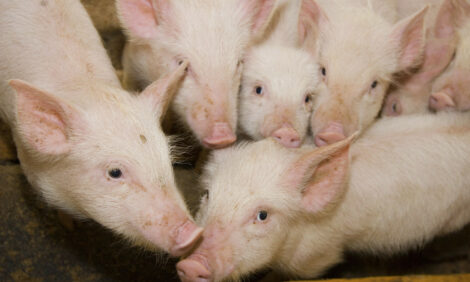



RP to Import 20,000 Tons of Pork to Avert Shortage
PHILIPPINES - An expected tight supply of pork in the coming holiday season amid low production has prompted the government, private traders and even hog raisers to agree to import an additional 20,000 metric tons (MT) this year.This, after consultations with hog farmers who admitted a supply gap as backyard farms have yet to recover from diseases that struck in the last two years.
"We are worried about the pork supply situation. We do not want a very sharp spike in prices," Agriculture Undersecretary Bernie G. Fondevilla said in a phone interview late last week. "Our [import] target is 20,000 MTto make sure that there is pork coming in."
Renato R. Eleria, chairman of the National Federation of Hog Farmers, Inc., concurred. "Supply is really tight. Backyard farmers are still affected by diseases in the past, so they have lower output," he said in an interview late last week. "We agreed to have a small importation for standby stock."
According to ABS-CBN News, backyard hog farms, which account for 70 per cent of total hog production, have yet to recover from diseases like the porcine reproductive respiratory syndrome and hog cholera.
Mr Fondevilla said the supply gap might push prices higher than P180 per kilogram in the holiday season. "We do not want that happening, of course."
Retail prices of pork averaged P150-P170 per kilogram last December, while prices early this week ranged from P160-P170/kg, data from the Bureau of Agricultural Statistics show.
Not all 20,000 MT will be imported in one batch "because we also want our local producers to be able to supply if they can," Mr Fondevilla said.
He explained that 5,000 MT will be delivered in November to the government while another 5,000 MT will be divided equally between private traders and hog producers. Another 10,000 MT might come in early in December.
Mr Eleria said that three years ago, the government allowed special importation of about 5,000 MT of pork to plug the supply gap in the holiday season.
To encourage private sector participation in the importation, Mr. Fondevilla said "we are asking the Finance department for a tax expenditure subsidy."
State tax expenditure subsidies are used to settle — on paper — customs duties and other taxes due the importation of goods.
The 20,000-MT imports will be on top of the 54,210 MT of fresh, chilled and frozen pork under the minimum access volume (MAV), Mr. Fondevilla said. Imports under the MAV scheme are slapped with 30 per cent duties, lower than the 40 per cent for import volumes outside the MAV.
The pork might be bought by state-run Food Terminal, Inc. from Canada, United States, Australia or the Netherlands, he added.
Mr Fondevilla said imported pork will likely cost P130/kg, including freight.
"Since part of the volume will be brought in by the government itself, our commitment to the private sector is that pork will not be released below P155/kg," Mr Fondevilla said. "That is also a way to protect our local industry and not to depress prices too much."
Hog output, which accounts for a tenth of total farm production, contracted by 1.6 per cent last year to 1.886 million MT, BAS data show.
Carlos B. Mendoza, executive director of the Livestock Development Council, said, "We might not attain the 4 per cent growth target. We changed the target to 2 per cebt growth because of low hog population."
But Mr Eleria said output could even drop 1 per cent - 1.5 per cent this year given low hog population.
Further Reading
| - | Find out more information on PRRS and Hog Cholera by clicking here. |








